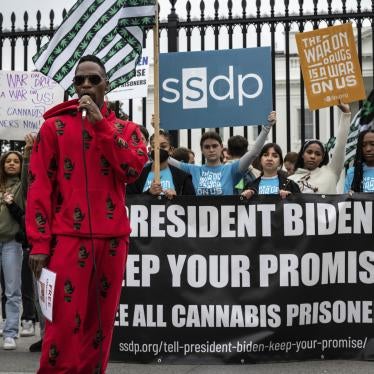When President Obama recently commuted the extraordinarily severe sentences of eight men and women convicted on federal crack cocaine charges, he rightly noted they had all been sentenced under an "unjust" law that mandated vastly harsher prison terms for crack than for powder cocaine offenses.
But the injustice in these cases wasn't limited to that disparity – nor even to fact that all were charged with offenses carrying harsh mandatory minimum sentences keyed solely to the type and amount of drug involved in their crime and not their role in the offense.
Prosecutors in half the cases used a 1986 sentencing provision that enables them to pursue sentences "enhanced" far beyond the mandatory minimum if the defendant has prior convictions. For defendants with one prior, their sentence can be doubled. If a defendant facing a ten-year minimum sentence has two prior drug convictions, the prosecutors can transform his sentence into life. The decision to use “enhancements” is in the prosecutor’s sole discretion and the courts have no choice but to impose the egregiously harsh enhanced sentences.
Take Stephanie Yvette George, one of the eight. She was convicted in 1997 because, as the judge said, she was the “bag holder and money holder” for crack-dealing boyfriends. She had been looking at a ten-year mandatory minimum sentence on crack conspiracy charges – already too severe a punishment for a bit player in the drug business. But prosecutors chose to increase her sentence to life because she had two earlier convictions for selling a total of $160 worth of crack – offenses for which she served nine months in a work-release program. Because there is no parole in the federal system, her life sentence was a sentence to die behind bars.
As George’s case illustrates, even a small-time drug offender with some petty prior convictions can be sentenced to life if a prosecutor decides to trigger the sentencing enhancement. Because mandatory sentences take no account of an offender's role in a crime, ten years is the minimum most street level dealers, bit players, and even couriers face unless they can secure a lower sentence through a plea agreement. Moreover, the prior convictions that turn ten years into a life sentence could have happened long ago, the defendant may never have been sentenced to prison (e.g. the sentence was for probation), and the crimes could have been as minor as simple possession of marijuana for personal use.
Some prosecutors use the enhancement provision in every case in which it's applicable. Most, however, use the threat of enhancements to strong-arm defendants into pleading guilty -- a threat they make good on if the defendant refuses. As one former prosecutor told me, "We would only invoke [the enhancement]…to penalize a defendant for the audacity of going to trial."
Two of the other prisoners in the commuted cases – Ricky Eugene Patterson and Billy Ray Wheelock, who both had prior drug convictions – refused to plead guilty. Patterson was indicted for conspiracy to sell 10 ounces of crack and faced a ten-year mandatory sentence. When he insisted on going to trial, prosecutors sought a sentencing enhancement for him based on two earlier convictions for simple possession of crack. Wheelock, too, was looking at a ten-year mandatory minimum sentence, and he too insisted on going to trial. The day jury selection in his trial began, prosecutors filed a notice to enhance his sentence based on two priors. Both Patterson and Wheelock were convicted and sentenced to life behind bars – not because of their drug crimes, but because they refused to plead guilty.
Prosecutors in the case of Ezel Gilbert, another of the commuted cases, sought a life sentence based on three prior petty drug crimes. Gilbert agreed to plead guilty and the prosecutors withdrew the sentencing enhancement. Although he still received a 24-year sentence, by foregoing his right to trial he avoided life without parole.
Punishment should fit the crime – not the defendant’s willingness to plead. No one knows how many men and women have foregone trial to avoid horrific sentencing enhancements nor how many are serving time in federal prisons with disproportionately severe sentences because they refused to plead. Our research into plea bargains in federal drug cases revealed prosecutors often see sentencing enhancements as a chip to be played during plea negotiations – a chip that can ruin lives. Among those eligible for a sentencing enhancement because of prior convictions, those who go to trial are 8.4 times more likely to have received the sentencing enhancements than those who plead – statistics that confirm prosecutors are more likely to pursue enhancements for people who exercise their right to trial.
In August 2013, Attorney General Eric Holder instructed federal prosecutors to avoid seeking sentencing enhancements in drug cases unless the circumstances warranted such severe sanctions. But he provided such broad criteria for determining whether such circumstances exist that, as Judge John Gleeson of the Eastern District of New York has pointed out, any capable prosecutor who wants to seek the enhancement can justify doing so.
The attorney general should prohibit prosecutors from threatening or seeking greatly increased sentences simply because defendants refuse to plead. But as long as the drug sentencing enhancement provision remains on the books, prosecutors are likely to use it. Congress should abolish the provision as part of a broader reform to the regime of mandatory minimum sentencing laws that have sent tens of thousands to prison with sentences that are neither just nor fair.
Fellner is senior advisor to the U.S. Program of Human Rights Watch and author of the recent Human Rights Watch report, An Offer You Can’t Refuse: How Federal Prosecutors Force Drug Defendants to Plead Guilty.







